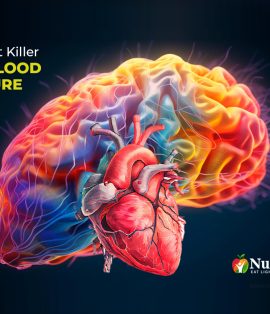Hidden Dangers of Hypertension
Why High Blood Pressure is Harmful?
Now a days high blood pressure is so common that it is often not taken seriously. But hypertension is the main root of many deadly chronic diseases. Hidden dangers of hypertension include disabilities that can destroy the quality of life and can also result into life threatening heart attacks and strokes.
Effect of High Blood Pressure on Different Parts Of Body
Dangers of Hypertension includes adverse effects on different body organs differently which are explain below
Damage to arteries
Increase in blood pressure overtime effects the flexibility of arteries and smoothness of inner lining of arteries.
Atherosclerosis:
When blood pressure rises it increases blood flow through blood vessels. The high blood flow damages the inner lining of blood vessels. The molecules absorbed from food sticks to these damages areas and destroys the smooth lining which further narrows the arteries also making them hard. This can lead to diseases like atherosclerosis, coronary heart disease, heart failure, enlargement of heart, metabolic syndrome, heart attack etc.
Aneurysm:
Constant high blood pressure weakens the artery, resulting in an enlargement known as an aneurysm. It has the potential to rupture, resulting in life-threatening internal bleeding. In the heart, the aorta is the most prevalent location for aneurysms.
“High Blood Pressure is the major health crisis in our world”
NutrantLife
Damage to the heart
Coronary heart disease
Narrowed and damaged of blood vessels constrict blood flow to the heart which causes unexplained chest pain usually known as angina.
Additionally, it may develop arrhythmias, or abnormal heartbeats, which might finally result in a heart attack.
Heart failure
The heart becomes stressed by high blood pressure. This may lead to the heart muscle weakening or stiffening over time, compromising its normal function. The overworked heart begins to fail gradually.
Enlarged left heart
Complications from high blood pressure force the heart to pump blood to the body more forcefully. This leads to an enlargement of the heart known as left ventricular hypertrophy (LVH). This increases the risk of heart failure and heart attack. Sudden cardiac death may result from it.
Metabolic syndrome
Numerous medical disorders, including high blood sugar, high triglyceride and fat levels, low HDL, etc., can cause or contribute to high blood pressure. These related health issues, which include potentially deadly heart attacks, diabetes, and strokes, make up metabolic syndrome.
Damage to the brain
For the brain to function properly, it needs a healthy blood supply. The following are some possible effects of high blood pressure on the brain:
Transient ischemic attack (TIA)
Because of high blood pressure, the blood arteries that supply the brain can sometimes stiffen or clot causing a temporary cut off to brain’s blood supply. This occurrence, often referred to as a mini-stroke or TIA that is frequently interpreted as a precursor to a large stroke.
Stroke
Elevated blood pressure can harm the brain’s blood vessels, leading to their rupture, leakage, or constriction. This results in a decline in oxygen and nutrition delivery, which kills brain cells. This occurrence increases the risk of stroke.
Dementia
Blood flow to the brain can be restricted by narrowed or clogged arteries. This may result in vascular dementia (where you start forgetting thing more often). Vascular dementia can also result from a single stroke or a series of small strokes that stop blood supply to the brain.
Mild cognitive impairment
This condition involves having slightly more trouble with memory, language, or thinking than other adults your age have. But the changes aren’t major enough to impact your daily life, as with dementia. High blood pressure may lead to mild cognitive impairment.
Damage to the kidneys
Kidneys are major organ that maintain blood pressure in the body. The manage blood pressure by controlling extra cellular fluid and hormone called renin.
The blood enter kidney through blood vessels. If blood pressure raises it can damage the blood vessels leading in kidney impairing their function.
High blood pressure and diabetes together heighten the harm.
Kidney Failure
When the kidney function is impaired, it cannot take out body waste effectively causing the toxic waste levels to rise in kidney leading to kidney failure.
One of the most frequent causes of renal failure is high blood pressure.
Damage to the eyes
The small, fragile blood arteries that provide blood to the eyes can be harmed by high blood pressure, leading to:
Retinopathy
Retinopathy occurs due to damaged blood vessels in the retina. Vision impairment ranging from hazy to total loss can be caused by damage to the blood vessels in the retina.
Having diabetes along with high blood pressure raises the risk of retinopathy.
Choroidopathy
This condition is causes by fluid buildup under the retina. This illness may cause blurred vision or, sometimes, scarring that reduces eyesight.
Neuropathy
Optic neuropathy is known as nerve damage in eye. The optic nerve, which is responsible for transmitting light signals to the brain, can be harmed by blocked blood flow. Damage to the eye may result in bleeding or loss of vision.
High blood pressure emergencies
Usually, high blood pressure is a chronic illness that deteriorates gradually over time. However, there are instances when a sudden and severe increase in blood pressure signals a medical emergency. When this occurs, immediate medical attention is required.
In certain circumstances, hypertension may result in:
- Blindness
- Chest pain
- Complications in pregnancy, such as the blood pressure-related conditions preeclampsia or eclampsia
- Heart attack
- Memory loss or gradual loss of consciousness
- Serious damage to the body’s main artery, also called aortic dissection
- Stroke
- Sudden impaired pumping of the heart, leading to fluid backup in the lungs that results in shortness of breath, also called pulmonary edema
- Kidney Failure
How to Reverse These Damages
Reversing the damages of high blood pressure is possible through a healthy lifestyle. Regular exercise, a balanced diet rich which ultimately help maintain a healthy weight that can also lower blood pressure and improve overall cardiovascular health. With consistent effort and consultation with a dietitian, it’s possible to reverse the damages of high blood pressure and live a healthier life.
CONTACT NUTRANTLIFE FOR HEALTHY LIFESTYLE










